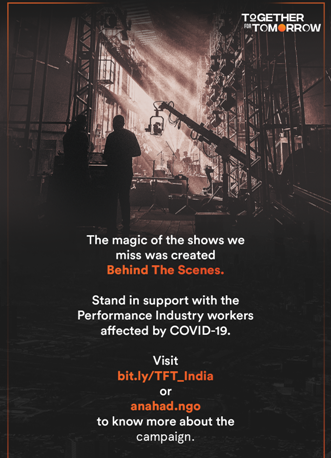 31st July, 2020
31st July, 2020The global pandemic COVID-19 has impacted every sector, and the music industry is no exception. The global music industry is worth over $50 billion and is heavily dependent on live music, which makes up over 50 per cent of total revenues. The live events market in India is reported to have incurred losses worth Rs. 40,000 crores between January to April 2020 and has put over 10 lakh jobs at risk.
It was the plight of skilled and unskilled workers like light and sound engineers, and tentwallahs who have been left jobless that inspired Spectal, a New Delhi-based boutique talent and brand agency to activate ‘Together For Tomorrow’ (TFT), an initiative that looks to generate awareness and funds for performance industry workers.
The initiative is in partnership with Universal Music-backed non-film platform VYRL Originals and new media enterprise OML.
The funds raised through TFT will be collected and disbursed through Anahad Foundation – registered as a Section 8 ‘Not forProfit’ organisation in 2013 – that works towards preserving and empowering folk music and musicians across India.
TFT grants will cover individuals who are not salaried and whose sole means of livelihood was the events and performance industry. Over two phases, the campaign will hope to cover up to 200 applicants.
To help filter the data collected, a panel comprising of industry stalwarts and stakeholders will vet the applicants and oversee the funds disbursement. Panelists for TFT include industry stalwarts like sound engineer Fali Damania, Mixtape founder Naveen Deshpande, SNL Pro founder Manish Mavani, and OML’s Supreet Kaur, KalidasShenoy and DharamSaraviya.
Why is there a need for a campaign like ‘Together For Tomorrow?’
Unlike in the West, where the creative arts sector has received funds and grants by government agencies, the events industry in India has received little help so far. The Events and Entertainment Management Association (EEMA) has filed a petition appealing to the Government of India to intervene with measures to support the lives of the 60 million Indians the event industry employs – directly and indirectly.
Unnoticed by many, the support staff and technical crew are the backbone of a live event. A typical mega-festival or live event employs anywhere from 900 to 1200 support staff including vendors, whereas for a club show that figure could be as low as 30.
“The live events and entertainment domain was one of the first ones to shut business and will probably be the last to reopen since these hinge on mass gatherings. The target group has been without any concrete work for close to four months now, and the situation is likely to prevail for the next 6-9 months at least. We fear due to lack of concrete support, this skilled manpower may look for alternative means of survival in other sectors which may lead to collapse of this sector. ‘Together For Tomorrow’ is the only cause that hopes to cater to the freelancers/daily wagers of the workers of the live entertainment industry. We are looking to support the backbone of the events industry without whom none of these live events would be possible,” TFT spokespersons Himanshu Chowdhary, Fali Damania and Manish Mavani said in a statement.
As per EEMA, the adverse impact of this crisis on the events and experiential industry is expected to last for months. The events and activations industry in India which was expected to cross Rs 10,000 crore mark by 2020-21, as per an EY-EEMA report, may not be able to meet its target.
Fear, uncertainty and restrictions have seen multiple large-scale events like music festivals and small-scale shows like gigs and corporate shows been cancelled and there is little clarity on when live events can resume in the future. The live events industry was the first sector to shut, and could perhaps be the last to resume.
To chart the progress of the campaign, as well as to donate, please visit:
